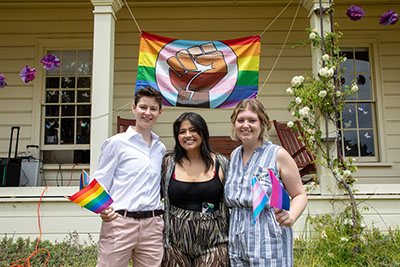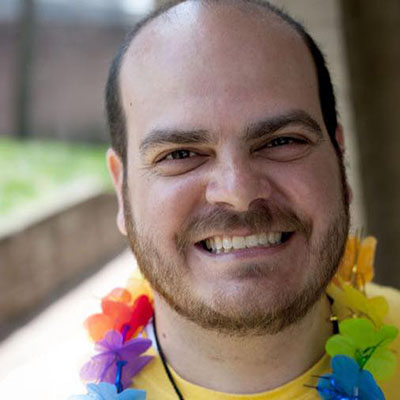Campus News
A welcoming place in the redwoods
The Lionel Cantú Queer Resource Center is a place for students to claim and proclaim their voices.


The Lionel Cantú Queer Resource Center is nestled in a far corner of the UC Santa Cruz campus. This cantilevered wood structure has floor-to-ceiling windows, cozy couches, and a refrigerator full of Capri Sun juice packets for anyone who might happen to want one.
Its out-of-the-way, homey feel belies the important work that has happened between its four walls over the past 33 years, according to those involved with the center.
The center has built a strong and active community of LGBTQIA+ students and staff, hosted myriad gatherings like Queer Prom and Lavender Graduation, and offered resources and help for housing and financial aid. It has also pushed for greater inclusivity on campus, including the establishment of all-gender restrooms.
The center’s cobbled-together budget is small, but talk to students involved with the center and they will describe how the Cantú, as it is informally called, provides a wide range of services: free clothes and shoes so students can experiment with different gender expression in a safe space, a place to get food when they run out of funds, and a setting where they can be with others who share their experiences and, sometimes, even find their own identity.
Its new director delfin bautista (they prefer lower-case) promises to continue and expand the center’s work.
The Cantú Center, they said, is historically a place where folks can come together to recognize they are not alone and also find their power in order to advocate for their needs.
“It’s a place where folks have claimed, reclaimed, and proclaimed their voices,” bautista said.
A long history
The history of the Cantú Center is scattered but it roots appear to lie in 1971, six years after UC Santa Cruz opened its doors. That was the year students formed the Gay Student Union (GSU). Four years later, the Gay and Lesbian Alliance (GALA) came into being, followed 14 years after that by the establishment of the Gay, Lesbian, Bisexual Network Resource Center.
It wasn’t until 1997, however, that the center got its first director. Deborah Abbott, a writer, health activist, alum and river guide was named to head what was called the Gay, Lesbian, Bisexual and Transgender Resource Center. The position was three-quarters time with a tiny budget and no staff.
In an oral history from 2002, Abbott recalled walking into the space with its potted plants and ever-hot tea kettle and feeling at home. The director also felt the neglect the space had endured while being piloted by a succession of capable but busy students over the previous seven years.
Abbott went to work, she said, haunting second-hand stores for better furniture, dismantling cliques that had been established, making sure all students felt welcome — especially students of color — and creating connections with other campus groups, while also retaining the center’s hominess.
“It felt really important to me to create a feeling of home, of welcome, for queer students who don’t often have a home they can go back to, who get cut off from their families, either partially or completely,” Abbott said in the oral history.
In 2004, the Center was renamed the Lionel Cantú Queer Resource Center after a beloved assistant professor of sociology, Lionel Cantú Jr., who died unexpectedly of cardiac arrest in 2002 at the age of 36. An openly gay professor whose research focused on the impact of sexuality and migration, he spent countless hours being available to students at the center and supporting its programs.
“The Cantú has provided me with a community I didn’t quite know existed,” said Sarah Donovan, an Oakes College politics major and economics minor who interns with the center and will graduate this year. “With Cantú I’ve grown more than ever with myself in terms of gender and sexuality. I felt a lot of my life that I had to hide myself to fit in and survive, and being at the Cantú is the exact opposite experience. I didn’t have to hide myself.”
Many achievements
Probably the center’s most visible achievement was its successful drive to establish all-gender restrooms at UC Santa Cruz. Currently, there are 55 all-gender public restrooms on campus, according to records.
Inside the space are other signs of the Cantú’s quiet success. There are cupboards and a refrigerator filled with food that is free to students who need it and racks of clothes to fit different gender expressions.
There are shelves of books that center on queer stories and history, and a supply of free items that may be expensive or hard to shop for: binders to flatten breasts, and packers to provide a masculine bulge in pants and bras with insertable cups. It also offers tampons, shaving cream and razors.
A recent pop-up on campus featuring free clothing that ranged across possible gender expressions drew 200 visitors, bautista said.
Maybe even more importantly, the center helps students find resources they may not know about.
“I needed a lot of support with financial aid when I got to campus,” said Camila Alvarado, a Stevenson College double major in art and history of art and visual culture who will graduate next year and is also an intern at the center. “The Cantú helped guide me through it. They got me in contact with people I wouldn’t have access to. I also needed a lot of support exploring more about myself and the Cantú creates those opportunities.” Now Alvarado hopes to pass these experiences on to younger students.
For Bridge Kennedy, a legal studies and sociology major from Stevenson College who will graduate this year and also interns at the center, the Cantú provided critical help. It helped them find housing after a bad experience with roommates and provided the mentorship they needed.
“I just really looked up to the older queer students,” Kennedy said. “They seemed to move through space with such confidence and ease. I saw them as role models and the type of young adult I wanted to grow into.”
bautista sees the center’s work continuing and expanding.
They plan more outreach into the greater Santa Cruz community; a focus on self-care for students, staff and instructors; a resource list for students who want to work on national issues; and a strengthening of the center’s inclusion work.
A recent LGBTQ pool party on campus was a first step in creating awareness for an increase in accessible and inclusive athletics and recreation facilities, bautista said.
bautista also wants to strengthen the center’s academic outreach in order to “bring another lens into the classroom,” they said.
“So, for instance, if a class is discussing civil rights, we will invite them, challenge them, to include a discussion of Bayard Rustin,” Bautista said. Rustin was a mentor to Dr. Martin Luther King Jr. and a chief organizer of the March on Washington but, because he was a gay Black man, his contributions have largely been ignored.
For bautista, the opportunity to lead the Cantú Center is a chance to not only raise awareness about the center and continue its work but also “to celebrate the gifts and contributions of our LGBTQ folks” in these troubled times.
“We need to mourn and grieve but we also need to celebrate resiliency,” they said.